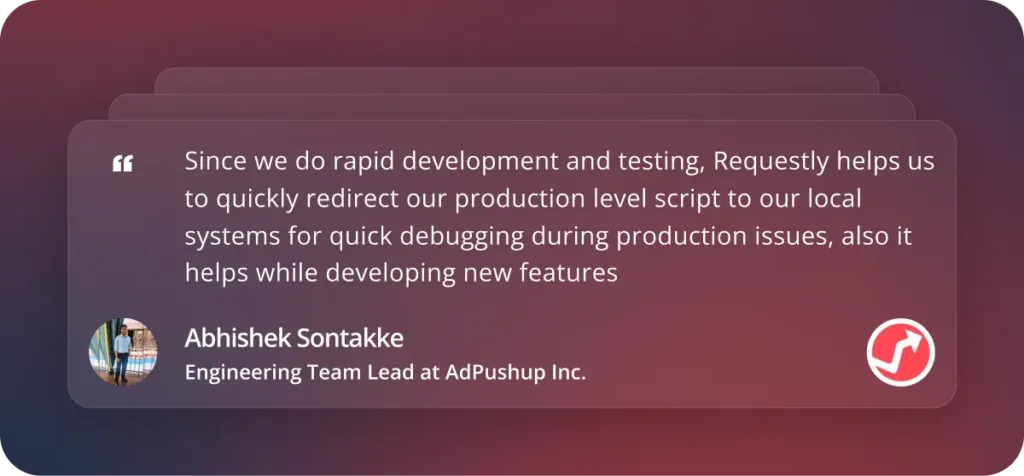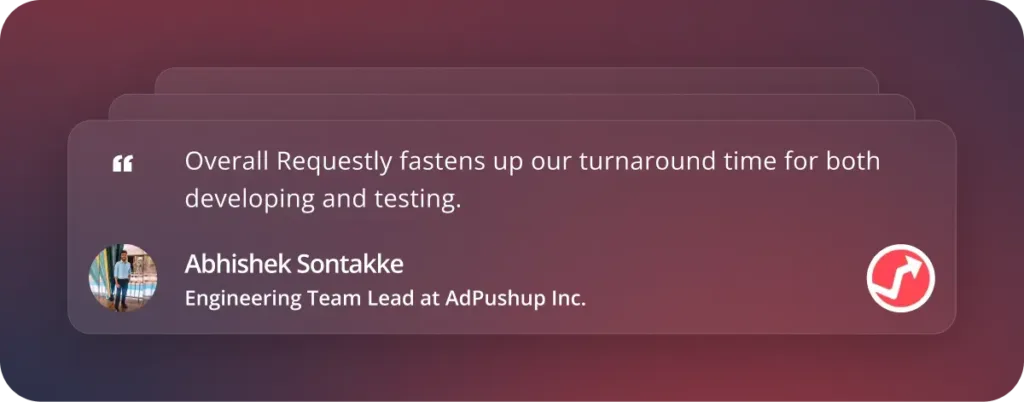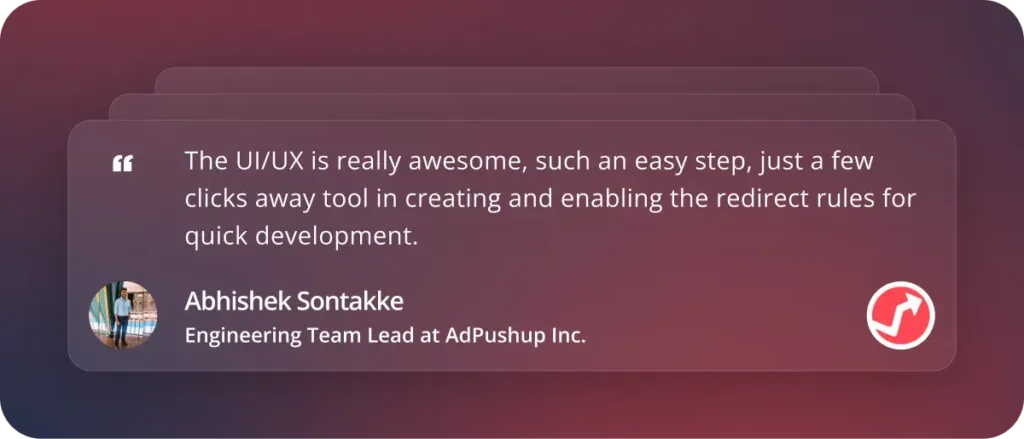Optimizing Ad Delivery with Requestly : Adpushup’s Story

Your lightweight Client for API debugging
No Login Required
Requestly is a web proxy that requires a desktop and desktop browser.
Enter your email below to receive the download link. Give it a try next time you’re on your PC!










Overview
Adpushup, a leader in ad revenue optimization, empowers publishers to maximize their ad performance through advanced, data-driven solutions. In the fast-moving world of AdTech, where time-to-market is crucial, speed and agility in development are essential for delivering timely updates and innovations. To ensure their engineering team could swiftly debug ad scripts and rapidly test new features in production-like environments, Adpushup turned to Requestly—an HTTP request modification tool that enables seamless debugging, testing, and optimization of ad delivery
Challenge
In the competitive AdTech landscape, Adpushup’s engineering team faced the challenge of ensuring rapid iteration and deployment without disrupting live environments. Debugging production issues often slowed down feature deployment, and traditional testing methods were insufficient for replicating real-world ad environments. The team needed a way to test and debug ads in real time, simulate different user experiences, and optimize ad performance without affecting live users or ad campaigns.

Solution
Adpushup adopted Requestly to supercharge their ad development and testing process. Several key rules from Requestly played a pivotal role in addressing their challenges:
- Redirect AdPushup.js from CDN to localhost
This rule allowed Adpushup to seamlessly redirect their core ad-serving script (adpushup.js) from the CDN to local environments for testing and debugging. AdOps teams could instantly evaluate changes to ad placements or formats without altering the production environment, ensuring smooth delivery to live users. This meant faster validation of changes and fewer delays in optimizing ad performance. - Redirect Prebid.js from Product to Localhost
Prebid.js is a crucial component of many programmatic advertising solutions, and this rule enabled Adpushup to redirect requests for Prebid.js to a local version during testing. By doing this, Adpushup’s team could test new configurations, header bidding strategies, or auction mechanics in real-time, simulating real-world scenarios before releasing updates. This capability was crucial for ensuring ad campaigns ran optimally without risking revenue loss due to faulty code. - Override GraphQL API Response
By using this rule, Adpushup could modify GraphQL API responses dynamically, simulating different user or campaign data in real-time. This was invaluable for testing personalized ad experiences, adjusting ad creatives, and optimizing targeting strategies. The ability to override API responses without backend changes allowed the team to simulate various ad scenarios and ensure that their systems could handle different data inputs effectively. - Modify HTTP Status Code
Testing how ads are delivered when the network experiences issues is critical for maintaining uptime and ad revenue. This rule allowed Adpushup to simulate various server responses—such as a 404 error or slow-loading pages—without modifying the backend. This enabled the engineering and AdOps teams to ensure that their ad-serving systems gracefully handled failures and maintained ad delivery even in challenging network conditions. - Replace Part of the URL
Repalce rule was particularly useful for Adpushup when testing different product types or categories in ad campaigns. By dynamically modifying URL parameters, such as switching product categories, Adpushup could simulate various ad targeting strategies or user behaviors, ensuring that the ads displayed were relevant and effective for different audiences. This flexibility allowed the team to optimize ad placements quickly, directly impacting the performance of their campaigns.
Each of these rules allowed Adpushup to optimize, debug, and enhance their ad-serving processes in real-time without affecting live campaigns, ensuring smooth ad delivery and performance.

Results
By integrating Requestly into their ad operations workflows, Adpushup achieved several benefits that were crucial to maintaining a competitive edge in AdTech:
- Test local scripts on prod 5X faster
Requestly’s redirect and script modification rules allowed Adpushup to iterate on ad configurations 5X faster, ensuring quicker testing and debugging of ad scripts without impacting live traffic. This meant faster deployment of optimizations, leading to better ad performance and higher revenue for their publisher clients. - Mock APIs in seconds
The ease of redirecting production scripts, modifying API responses, and testing ads in a production-like environment enabled AdOps and engineering teams to work more efficiently. Requestly’s intuitive UI/UX allowed the teams to make quick adjustments, freeing them to focus on maximizing ad revenue rather than getting bogged down in complex configurations. - Simulate real-world scenarios like Slow Network Responses
Requestly enabled Adpushup to simulate real-world scenarios, such as slow network responses or different user targeting strategies, ensuring that their ads were optimized for performance under all conditions. This not only improved ad delivery but also ensured that new features were rigorously tested before deployment, minimizing the risk of disruptions.

Looking Ahead
As Adpushup continues to innovate in the AdTech space, Requestly will remain a core tool in their ad operations toolkit, enabling rapid testing, debugging, and optimization. The team is excited to explore future enhancements from Requestly, further accelerating their ability to deliver cutting-edge ad solutions to publishers and ensuring top-tier ad performance for their clients.
Contents
Subscribe for latest updates
Share this article
Related posts
Get started today
Requestly is a web proxy that requires a desktop and desktop browser.
Enter your email below to receive the download link. Give it a try next time you’re on your PC!



















